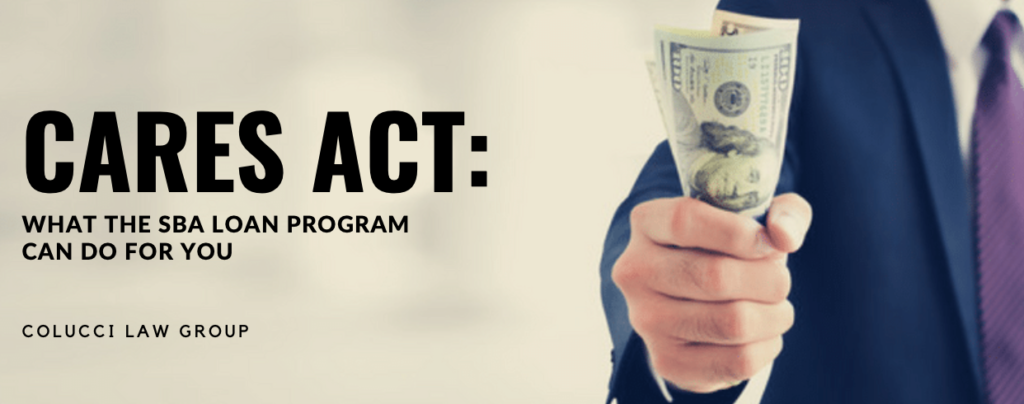
The Federal Government CARES
The Coronavirus Aid, Relief, and Economic Security Act (CARES Act) was signed into law by President Trump on March 27, 2020 to help large and small businesses, individuals and families, cope with the rapid and relentless devastation that the COVID-19 pandemic has unleashed on the U.S. economy.
At Colucci Law Group, we’re here to break down the need-to-know programs of relief that may help those struggling against the effects, economic and otherwise, of COVID-19. The following is a list of programs to pay special attention to:
Economic Injury Disaster Loan Program (EIDL)
The CARES Act made several changes to the Economic Injury Disaster Loan (EIDL) Program under Section 7(b) of the Small Business Act. The EIDL is designed to cover injury resulting from loss of revenue, lost profits, rentals, etc. Changes made within the EIDL include:
- The requirement for personal guarantees on loans under $200,000 was removed.
- The requirement that the borrower not be able to secure credit elsewhere was removed.
- The requirement that the borrower be in business for one year, provided the business was in operation on January 31, 2020.
Since this program was already in effect, no other major changes were made, and it continues to be administered through the SBA.
NOTE: An applicant may receive an EIDL Loan and loans under other programs (such as the Paycheck Protection Program) as long as the basis for the loans / costs being paid with each are different. What does this mean? No “double-dipping”!
Paycheck Protection Program
The Paycheck Protection Program was devised to cover overhead for qualified small businesses to maintain their payroll, pay rent, and keep the lights on during the COVID-19 pandemic. The money will be provided in the form of a forgivable loan, based on the number of full-time equivalent employees.
- Fewer than 500 employees, or not more than 500 employees at any one location if a hotel or food service.
- Maximum interest rate of 4% per annum.
- Must have been in business on February 15, 2020 and had paid employees on that date.
- As with EIDL, the borrower does not have to show he cannot obtain credit elsewhere.
- No requirement for collateral.
- No prepayment penalties.
To obtain these loans, and to deter the owner from claiming employees and pocketing the cash, at the time of applying, the owner or employer will have to certify, and provide documentation for the following:
- That the current emergency makes the loan necessary for payroll and immediate overhead;
- That funds will be used to keep workers and make payroll, to make mortgage payments, lease payments, and utility payments;
- The borrower will be required to provide tax returns, mortgage statements, lease or rent receipts, utility bills, and other documentation for this portion of the application.
- That the applicant does not have any other application pending for other payroll assistance under the CARES Act.
- The EIDL, portions of the Human Services, and Economic Stabilization Act may have such provisions, and SBA loans may conflict with these sections.
Loan Forgiveness Programs
The Loan Forgiveness Program of the CARES Act strives to get the small business sector back on its feet as quickly as possible. These loans come with a safety net of their own. The loans will be forgiven up to the amount spent in the first eight weeks following the loan start date on payroll, mortgage interest, rent, and utilities, but the employer will be penalized by a reduction in the amount forgiven for any employee terminated during that period and not rehired.
There is a grace period for employees terminated or laid off between February 15, 2020 and April 26, 2020 (the time between the start of the national emergency and the end period when the SBA begins granting loans), provided the employees are rehired before June 30, 2020.
If you have questions or would like further information, please contact us at Colucci Law Group at 904-217-0124 or visit our website YourRightsOurFight.com.
As we continue to monitor the novel coronavirus (COVID-19), the lawyers at Colucci Law Group are working closely to stay current on developments and counsel clients through the various legal and business issues that may arise across a variety of sectors.
